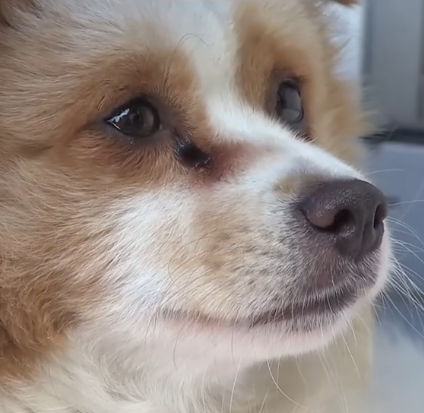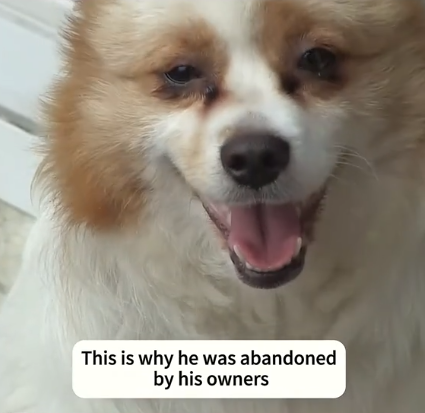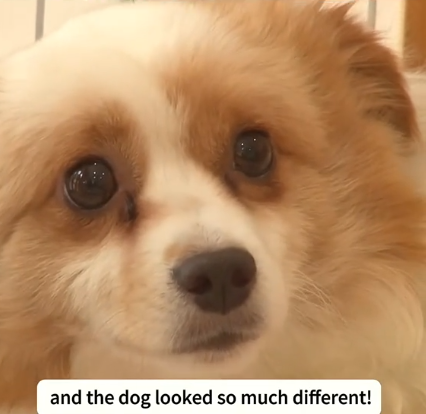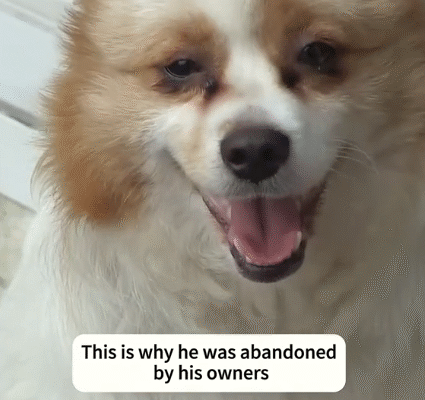
It started one rainy evening in early September. I was on my way home from work, umbrella struggling against the wind, when I first saw him. A medium-sized dog, thin and soaked to the bone, sat curled up just outside my apartment building’s entrance. He didn’t look up as I passed. He didn’t bark, beg, or move. He just squatted there quietly, staring ahead as if waiting for something… or someone.
I didn’t think much of it at the time. Strays are common in the city, and I figured he’d move on once the rain stopped. But the next morning, when I opened my door to leave for work, there he was again—same spot, same position. His fur was dry now but matted and dirty, and his ribs showed through his thin frame. Still, he didn’t look at me or try to approach.
This repeated for the next two days. Rain or shine, the dog would be there—always outside the building, just beside the door, squatting in silence. My neighbors began to notice too. Some stepped around him nervously. Others muttered about “calling someone” to deal with it. A few, like old Mrs. Chen on the third floor, left scraps of food. But what was strange… was that he never ate.
He would sniff the food, maybe nudge it slightly with his nose, and then turn away. Water bowls were left for him too, but barely touched. People tried coaxing him with treats, calling out in gentle tones, but he refused to engage. He wasn’t aggressive. He wasn’t afraid. He simply didn’t want anything… except to wait.
Curiosity got the better of me by the fifth day. I knelt a few feet from him and softly spoke, “Hey buddy… are you waiting for someone?”
For the first time, he lifted his head. His eyes met mine. They weren’t the eyes of a lost or frightened dog. They were filled with sadness—an emotion so deep it made me catch my breath. Then he looked away again and resumed his still vigil.
I couldn’t shake the feeling. That night, I asked around the building. Eventually, I found out that a woman named Hana used to live on the first floor. She had passed away just two weeks earlier. She lived alone, and from what her neighbor recalled, she had a dog. A golden mix-breed mutt she rescued five years ago from a drainage ditch. His name was Bao.

“Wait,” I said, “her dog? What happened to him?”
“They took him to a shelter,” her neighbor said with a shrug. “But I guess he must’ve gotten out. Maybe he found his way back here.”
I felt cold all over. That would mean Bao had traveled across the city, miles from the shelter, just to return to the place where he last saw her. And now he sat—day and night—squatting outside the door she used to open.
That night I brought him a blanket. He didn’t resist when I gently placed it near him. I stayed for a while, watching the quiet street, the occasional car passing by, the sound of a distant TV echoing from a window above.
“I’m sorry, Bao,” I whispered. “She’s not coming back.”
He blinked slowly, and though he didn’t move, something in his eyes shifted. It was as if he understood
Over the next week, people came and went. Some ignored him. Others tried to help. A young couple even offered to take him in. But he refused to leave. Whenever someone tugged at his leash or tried to lift him, he’d pull away and return to his spot—outside the door. Squatting. Waiting.
He still didn’t eat.
I made it a habit to sit with him every evening. I didn’t try to feed him anymore. I just sat beside him. Sometimes I’d read. Sometimes I’d talk. Other times we sat in silence. Strangely, I began to find comfort in his presence. There was a strange peace in the loyalty he carried, however heartbreaking it was.
Then, one morning, he didn’t lift his head when I opened the door.
I froze.
I dropped to my knees, calling his name, gently shaking him—but he didn’t move.
Bao had passed away in his sleep, right in front of the door he’d waited at for nearly two weeks.
The building fell quiet that morning. People stood silently as I wrapped him in the same blanket I had given him days ago. I buried him in the small park across the street under the old magnolia tree. A neighbor helped me put up a small wooden sign. It read:

“Bao – Loyal to the end. A heart that waited.”
There were tears in my eyes—not just for him, but for everything he represented. In a world so fast-moving, so distracted, here was a creature who had loved so deeply, so purely, that he refused to move on. Even when there was nothing left. Even when his body was failing him. He waited. Because hope—however painful—was stronger than hunger, stronger than fear, stronger than even the passage of time.
I still pass by that door every day. And I still see him there in my mind. Quiet. Still. Faithful.
He didn’t eat.
He didn’t bark.
He just kept squatting outside the door.
Waiting for love that would never return.
But in doing so, he taught the entire neighborhood what it meant to love truly. To wait unselfishly. To remain loyal when the world tells you to move on.
And for that, we will never forget him.



